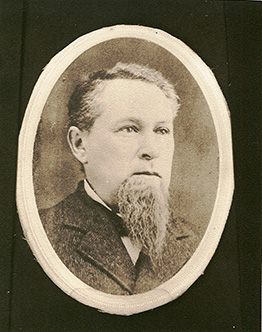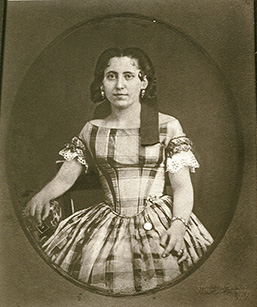 Volume I: Narrative History
Volume I: Narrative History Volume I: Narrative History
Volume I: Narrative History
Edwin Thanhouser was born on November 11, 1865, the third child of Samuel and Julia Thanhouser. Edwin's father, Samuel Thanhouser, was born on November 18, 1836 in Ichenhausen, not far from Ulm in the Bavarian district of Germany. He emigrated to America as a young man, in an era when many inhabitants of Germany sought the opportunities offered by a life across the Atlantic. Note Julia, who was to become Samuel's wife, was born on January 21, 1838 in Hechingen, a small German town, located about halfway between Stuttgart and the Swiss border. She also came to America at a early age. Julia's father was principal of a school in Hechingen. Note


Sam Thanhouser (L) and Julia Thanhouser (R). Courtesy Thanhouser Family Archives
Samuel and Julia were married in the late 1850s. In 1859 they were living in Ottawa, Illinois, where their first child, a son, Edie, was born on January 10th. He lived only a few years, and died in Baltimore on December 20, 1863. Note A second child, Frank, was born in Ottawa on December 1, 1860. He graduated from high school, spent a year at Harvard, and married Millie, the daughter of a prominent Milwaukee family. The couple had one child, Marian. Frank died in Milwaukee on November 11, 1915.
On November 11, 1865, when Samuel Thanhouser and his family were still living in Baltimore, their third child, Edwin, was born. Samuel did not remain in any one place or in any single occupation for a long time. The family moved to Fort Wayne, Indiana; Garden City, Kansas; Matamoros, Mexico; and to both Lancaster and Milwaukee, Wisconsin.
In a monograph privately printed in 1970, The Thanhouser Family, Edwin's son Lloyd F. Thanhouser related: Note
[Samuel] engaged in various businesses, including ownership of several stores and a bank. He was also active in Masonic affairs and Democratic politics. During President Grover Cleveland's first administration (1885-) Sam was appointed receiver of public monies at Garden City, Kansas, Note and during Cleveland's second administration (1893-1897) he was the United States Consul to Mexico at Matamoros, just across the Rio Grande River from Brownsville, Texas.
My own recollections of Grandpa Thanhouser are rather meager because he died when I was only nine. He was an imposing, heavy-set man with a bald head, white chin whiskers and a good round belly. As a tot, I provoked gales of laughter by declining to sit in his lap because, as I announced, he did not have any. I also remember visiting his store in Lancaster, Wisconsin, during the winter of 1906-1907. The last time I saw him was in 1910 or 1911, when he visited us in New Rochelle. During that visit, Grandpa was photographed sitting at a desk in a movie set at the Thanhouser studio.
Although Samuel Thanhouser was adept at earning money in various endeavors, keeping it was another matter entirely. Family tradition relates that he was an "easy touch" to those seeking loans, that he often made ill-advised bets on election results and other events, that he spent and could not repay funds left with him for safekeeping by his son Edwin in the 1890s, and that he went through bankruptcy around 1900.
One of Samuel Thanhouser's stories concerned a missed opportunity in the late 1880s, when as receiver of public monies at Garden City, Kansas he received advance information on the opening of federal lands in the Indian Territory, which later became the state of Oklahoma. Sam and certain of his friends laid plans to become "sooners" and to race to stake out what they believed were especially desirable tracts of 160 acres each in an area which was later to be in the center of Oklahoma City. "On the day that they were to beat the crowd it was raining very hard, so they called it off. We might have been a very wealthy family if we had 160 acres in the middle of the Oklahoma City oil field," Samuel's grandson Lloyd noted years later.
His wife, Julia, maintained the Thanhouser family household. Having a practical turn of mind, and being less gullible than her husband, she looked with suspicion upon some of Samuel's business acquaintances. Her forte was cooking in the German style, and she often spent the entire day in the kitchen preparing one delicacy or another.
In later years, Edwin provided for his father Samuel until he died in Chicago on November 11, 1911, and was buried in Greenwood Cemetery in Milwaukee. His wife, Julia, who died on December 25, 1921, Note and their son Frank were buried in adjacent plots.
Copyright © 1995 Q. David Bowers. All Rights Reserved.